
Bio-retinol Illustration
Bio-retinol, a natural alternative to synthetic retinol, delivers powerful anti-aging benefits by stimulating collagen production and accelerating skin cell turnover. This bio-derived ingredient enhances skin texture, reduces fine lines, and evens out skin tone with minimal irritation. Its gentle yet effective properties make it ideal for sensitive skin and those seeking a sustainable skincare routine.
Understanding Bio-Retinol: What Sets It Apart in Women’s Skincare
Bio-retinol is a plant-derived alternative to traditional retinol, offering powerful anti-aging benefits without the harsh side effects often associated with synthetic retinoids. It stimulates collagen production and enhances skin cell turnover, resulting in smoother, firmer, and more radiant skin in women. Unlike conventional retinol, bio-retinol is more suitable for sensitive skin, making it a preferred choice in natural and organic skincare formulations.
Key Benefits of Bio-Retinol for Women’s Skin Health
Bio-retinol is a powerful, plant-based alternative to traditional retinol that helps reduce the appearance of fine lines and wrinkles by promoting collagen production and enhancing cellular turnover. It supports skin hydration and improves elasticity, leading to a firmer, more youthful complexion without causing irritation or sensitivity often associated with synthetic retinoids. Women benefit from bio-retinol's ability to even out skin tone, diminish hyperpigmentation, and boost overall radiance for healthier, revitalized skin.
How Bio-Retinol Works: Mechanism of Action Explained
Bio-retinol stimulates collagen production by activating retinoic acid receptors in skin cells, promoting cell turnover and reducing fine lines and wrinkles. Its molecular structure allows for gradual release and enhanced skin absorption, minimizing irritation compared to traditional retinol. This action supports skin renewal, improves texture, and boosts overall radiance.
Comparing Bio-Retinol with Traditional Retinol in Cosmetics
Bio-retinol, derived from natural botanical sources, offers a gentler alternative to traditional retinol in cosmetics, minimizing irritation and sensitivity often caused by synthetic retinoids. It provides comparable anti-aging benefits, such as stimulating collagen production and improving skin texture, while enhancing tolerance for sensitive skin types. Unlike conventional retinol, bio-retinol typically features a more sustainable, eco-friendly manufacturing process aligning with natural skincare trends.
Top Bio-Retinol Benefits for Anti-Aging and Skin Rejuvenation
Bio-retinol boosts collagen production, visibly reducing fine lines and wrinkles while enhancing skin elasticity for a youthful appearance. Your skin benefits from accelerated cell turnover, promoting a smoother, brighter complexion and diminishing age spots. This potent ingredient also improves hydration and firmness, making it a top choice for effective anti-aging and skin rejuvenation.
Optimal Bio-Retinol Dosage and Application for Women
Optimal bio-retinol dosage for women typically ranges from 0.5% to 2%, balancing efficacy with minimal irritation to promote collagen synthesis and skin renewal. Applying bio-retinol during nighttime skincare routines enhances absorption and reduces photosensitivity, with gradual introduction recommended to build tolerance. Consistent use, combined with broad-spectrum SPF during the day, maximizes anti-aging benefits while protecting skin integrity.
Bio-Retinol for Sensitive Skin: Is It Safe for All Women?
Bio-retinol, derived from natural plant sources like bakuchiol, offers a gentle alternative to traditional retinol, making it suitable for sensitive skin by reducing irritation and redness. Clinical studies reveal that bio-retinol effectively promotes collagen production and skin cell turnover without the harsh side effects often associated with synthetic retinoids. Dermatologists recommend bio-retinol formulations for all women seeking anti-aging benefits while maintaining skin barrier integrity and minimizing sensitivity reactions.
Common Side Effects of Bio-Retinol and How to Minimize Them
Common side effects of bio-retinol include redness, irritation, peeling, and increased sensitivity to sunlight. To minimize these effects, use a gentle cleanser, apply a moisturizer regularly, and start with a lower concentration to allow Your skin to adjust gradually. Always apply sunscreen during the day to protect Your skin from UV damage while using bio-retinol products.
Best Practices for Incorporating Bio-Retinol into Women’s Skincare Routines
Incorporating bio-retinol into women's skincare routines requires starting with low concentrations to minimize irritation and gradually increasing usage to build tolerance. Applying bio-retinol at night followed by a broad-spectrum sunscreen during the day protects skin from UV damage and enhances efficacy. Combining bio-retinol with hydrating ingredients like hyaluronic acid supports skin barrier health and reduces dryness commonly associated with retinoid use.
Choosing the Right Bio-Retinol Products for Your Skin Type
Selecting the right bio-retinol product requires careful attention to your skin type, as formulations vary in concentration and additional ingredients targeting specific concerns such as dryness, sensitivity, or acne. Those with sensitive skin should opt for bio-retinol products enriched with soothing botanicals to minimize irritation, while oily or acne-prone skin benefits from lightweight, non-comedogenic options that regulate sebum production. Understanding your skin's unique needs allows you to maximize the anti-aging and cell-renewing benefits of bio-retinol while maintaining a balanced, healthy complexion.
 womendy.com
womendy.com